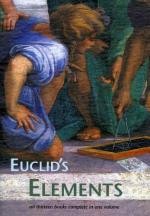|
This section contains 1,018 words (approx. 4 pages at 300 words per page) |

|
EUCLID (c. 300 BCE) was a Greek mathematician. Plato described mathematics as a discipline that turns one's gaze from the Becoming of the sensible world to the Being of the intelligible. The great value of mathematics is to prepare the mind for the apprehension of pure ideas. After Plato's death, geometry flourished among his students. One of the few details known about Euclid's life is that he studied under Plato's followers. Subsequently he founded the great school of mathematics at Alexandria, Egypt. He wrote on mathematics, optics, and astronomy.
Euclid's Elements is the most influential work in all of mathematics. Though other "Elements" were produced before Euclid, his work organized and completed that of his predecessors, who are now known chiefly by reference. As the letters (Gr., stoikheia; "elements") of the alphabet are to language, so are the Elements to mathematics, wrote the Neoplatonist Proclus in the fifth century...
|
This section contains 1,018 words (approx. 4 pages at 300 words per page) |

|


